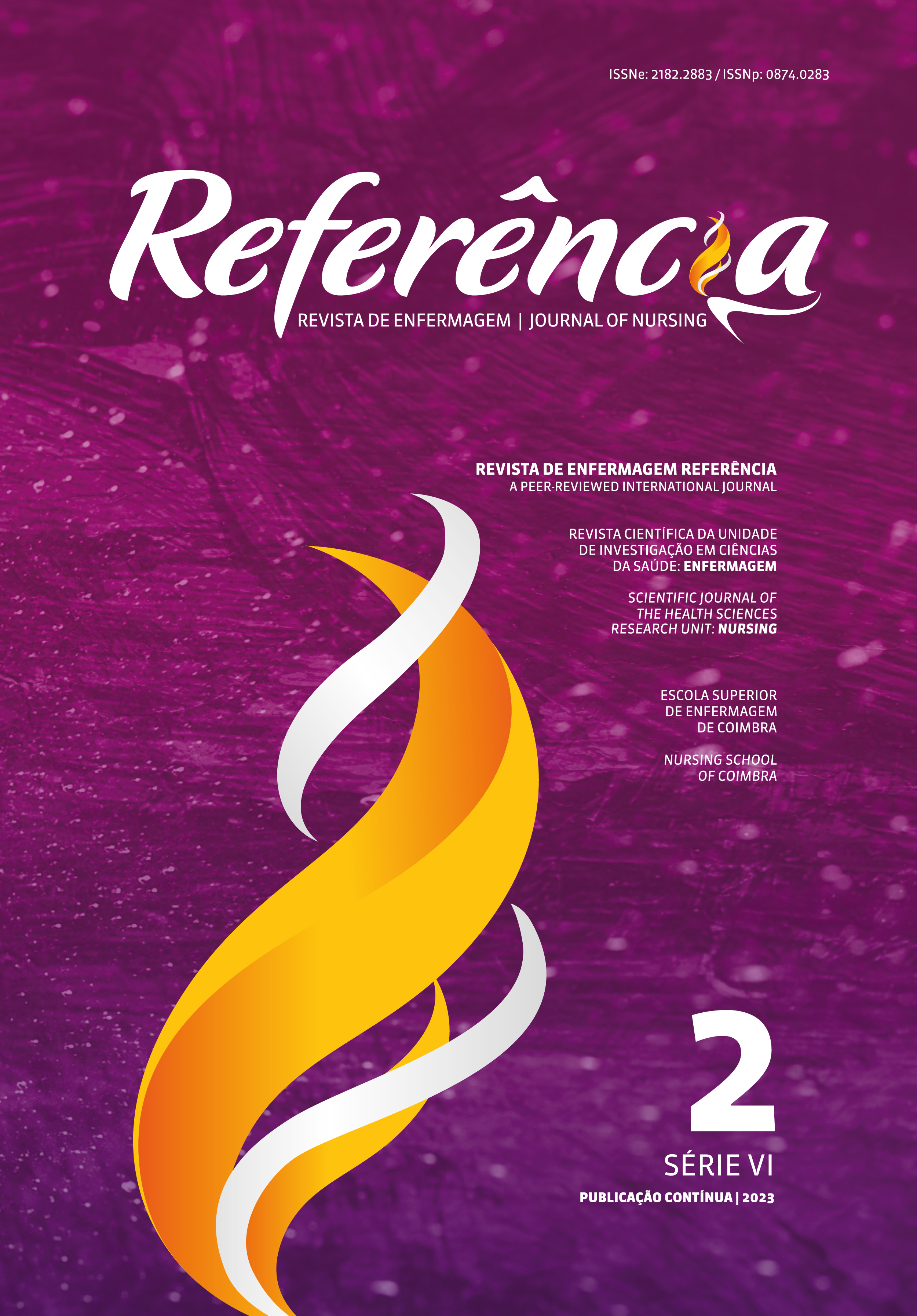Tradução, adaptação cultural e validação da Escala de Apoio a Políticas Associadas ao Álcool em universitários mexicanos
DOI:
https://doi.org/10.12707/RVI22023Palavras-chave:
consumo de álcool, estudantes universitários, políticas públicas, validação de escala, fiabilidadResumo
Enquadramento: A proteção da saúde através da prevenção e redução do consumo de álcool é uma prioridade de saúde pública. Foram identificadas algumas escalas para avaliar as políticas públicas em matéria de álcool, mas em língua inglesa.
Objetivo: Avaliar as propriedades psicométricas da tradução e adaptação cultural de uma escala para avaliar o apoio às políticas sobre o álcool em jovens estudantes universitários mexicanos.
Metodologia: Estudo metodológico, com a participação de 367 estudantes universitários do sul do México. A validade do constructo foi estimada através de uma análise exploratória dos fatores e a consistência interna do questionário foi verificada para verificar a sua fiabilidade
Resultados: A consistência interna foi de 0,96. A validade de constructo foi realizada por médio de análise fatorial exploratória, identificando uma estrutura de três fatores: redução de danos, marketing e informação, e preço e disponibilidade.
Conclusão: A escala mostrou fiabilidade e validade adequadas, e pode ser aplicada em espanhol como um indicador empírico em estudos relativos a políticas públicas sobre o álcool em jovens estudantes universitários.
Downloads
Referências
Bates, S., Holmes, J., Gavens, L., Matos, E. G., Li, J., Ward, B., Hooper, L., Dixon, S., & Buykx, P. (2018). Awareness of alcohol as a risk factor for cancer is associated with public support for alcohol policies. BMC Public Health, 18(1), 688. https://doi.org/10.1186/s12889-018-5581-8
Burton, R., Henn, C., Lavoie, D., O’Connor, R., Perkins, C., Sweeney, K., Greaves, F., Ferguson, B., Beynon, C., Belloni, A., Musto, V., Marsden, J., & Sheron, N. (2017). A rapid evidence review of the effectiveness and cost-effectiveness of alcohol control policies: An English perspective. Lancet, 389(10078), 1558–1580. https://doi.org/10.1016/S0140-6736(16)32420-5
Buykx, P., Li, J., Gavens, L., Lovatt, M., Matos, E. G., Holmes, J., Hooper, L, Meier, P. (2016). An examination of public attitudes towards alcohol policy. University of Sheffield and Cancer Research UK. https://www.cancerresearchuk.org/sites/default/file/buykx_et_al_2016_an_examination_of_public_attitudes_towards_alcohol_policies_2.pdf
Casswell, S., Huckle, T., Wall, M., Parker, K., Chaiyasong, S., Parry, C., Viet Cuong, P., Gray-Phillip, G., & Piazza, M. (2018). Policy-relevant behaviours predict heavier drinking and mediate the relationship with age, gender and education status: Analysis from the International Alcohol Control Study. Drug and Alcohol Review, 37 (Suppl. 2), S86–S95. https://doi.org/10.1111/dar.12669
Chávez, L. M., & Canino, G. (2005). Toolkit on translating and adapting instruments. Human Services Research Institute. https://www.hsri.org/files/uploads/publications/PN54_Translating_and_Adapting.pdf
Cherpitel, C. J., Witbrodt, J., Korcha, R. A., Ye, Y., Kool, B., & Monteiro, M. (2018). Multi-level analysis of alcohol-related injury, societal drinking pattern and alcohol control policy: Emergency department data from 28 countries. Addiction, 113(11), 2031–2040. https://doi.org/10.1111/add.14276
Davoren, M. P., Lane, D., Kirby, J., Gibney, K., Kinsley, G., Hope, A., Byrne, M., & Perry, I. J. (2018). Support for evidence-based alcohol policy in Ireland: Results from the Community Action on Alcohol Pilot Project. Journal of Public Health Policy, 40(1),76–90. https://doi.org/10.1057/s41271-018-0151-y
Fairlie, A. M., DeJong, W., & Wood, M. D. (2015). Local support for alcohol control policies and perceptions of neighborhood issues in two College Communities. Substance Abuse, 36(3), 289–296. https://doi.org/10.1080/08897077.2014.937516
Foster, S., Gmel, G., & Mohler-Kuo, M. (2019). Light and heavy drinking in jurisdictions with different alcohol policy environments. The International Journal on Drug Policy, 65, 86–96. https://doi.org/10.1016/j.drugpo.2019.01.014
Kongats, K., McGetrick, J. A., Thomson, M., Raine, K. D., & Nykiforuk, C. (2020). Policy Influencer and general public support for proposed alcohol healthy public policy options in Alberta and Quebec, Canada. Journal of Studies on Alcohol and Drugs, 81(1), 47–57. https://doi.org/10.15288/jsad.2020.81.47
Lam, T., Lenton, S. R., Burns, L., Aiken, A., Ogeil, R., Gilmore, W. T., Chikritzhs, T. N., Lloyd, B., Lubman, D. I., Mattick, R., & Allsop, S. J. (2015). Alcohol policy impact on young risky drinkers and their support for proposed measures. Australian and New Zealand Journal of Public Health, 39(2), 129–134. https://doi.org/10.1111/1753-6405.12326
López Aguado, M., & Gutiérrez Provecho, L. (2019). Cómo realizar e interpretar un análisis factorial exploratorio utilizando SPSS. REIRE Revista d’Innovació i Recerca en Educació, 12(2), 1-14. https://doi.org/10.1344/reire2019.12.227057
World Health Organization. (2018). Global status report on alcohol and health 2018. https://apps.who.int/iris/bitstream/handle/10665/274603/9789241565639-eng.pdf?ua=1.2
Organización Panamericana de la Salud. (2015). Informe de situación regional sobre el alcohol y la salud en las Américas. https://www.paho.org/hq/dmdocuments/2015/alcohol-Informe-salud-americas-2015.pdf
Organización Panamericana de la Salud. (2018). Calificación de las políticas en materia de alcohol, evaluación del nivel de ejecución de la Estrategia Mundial de la OMS para reducir el uso nocivo del alcohol en la Región de las Américas. https://iris.paho.org/bitstream/handle/10665.2/49679/9789275320457_spa.pdf?sequence=3&isAllowed=y
Parry, C., Londani, M., Enkhtuya, P., Huckle, T., Piazza, M., Gray-Phillip, G., Chaiyasong, S., Viet Cuong, P., & Casswell, S. (2018). Support for alcohol policies among drinkers in Mongolia, New Zealand, Peru, South Africa, St Kitts and Nevis, Thailand and Vietnam: Data from the International Alcohol Control Study. Drug and Alcohol Review, 37(Suppl. 2), S72–S85. https://doi.org/10.1111/dar.12647
Silver, D., Macinko, J., Giorgio, M., & Bae, J. Y. (2019). Evaluating the relationship between binge drinking rates and a replicable measure of U.S. state alcohol policy environments. PloS one, 14(6), e0218718. https://doi.org/10.1371/journal.pone.0218718
Tonkuriman, A., Sethabouppha, H., Thungjaroenkul, P., & Kittirattanapaiboon,P. (2019). A causal model of binge drinking among University Students in Northern Thailand. Journal of Addictions Nursing, 30(1), 14–23. https://doi.org/10.1097/JAN.0000000000000261
Valdez, P. E., Pech, P. D., & Lira, M. J. (2018). Expectativas como predictores del consumo de alcohol en universitarios. Revista Latinoamericana de Medicina Conductual, 8(2), 43-49. http://www.revistas.unam.mx/index.php/rlmc/article/view/67351/60047
Weerasinghe, A., Schoueri-Mychasiw, N., Vallance, K., Stockwell, T., Hammond, D., McGavock, J., Greenfield, T. K., Paradis, C., & Hobin, E. (2020). Improving knowledge that alcohol can cause cancer is associated with consumer support for alcohol policies: Findings from a real-world alcohol labelling study. International Journal of Environmental Research and Public Health, 17(2), 398. https://doi.org/10.3390/ijerph17020398






















